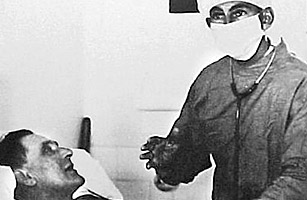
Barnard with his patient Louis Washkansky.
Dec. 3, 1967
I was 15 years old when Christiaan Barnard performed the first heart transplant. I still have the Life magazine cover. My dad was a cardiologist, so the drama carried out in the public's imagination was reinforced by my respect for the practice of medicine and discovery. My ultimate choice of going into surgery and then into heart surgery and then heart transplantation I trace back to that single operation.
This procedure reversed what had been inevitable death from heart disease, restoring the opportunity of new life. It demonstrated the ability of an individual working with a team to revolutionize health care. The interesting thing is that it was the relatively inexperienced Barnard who made history in the new field. He beat to the punch — and undercut — more systematic and more disciplined scientists and surgeons of the time. Dr. Norman Shumway of Stanford University (who was my mentor) had patiently and with great rigor made a decade of systematic research by writing papers, teaching others and working through the challenges of the procedure. Barnard, who watched some of these procedures being carried out when he trained in the U.S., went back to South Africa and — with very little background and at the age of 45 — seized the moment and performed this transplant. His patient died 18 days later, for Barnard was racing ahead of medicine's understanding of tissue rejection. But the pioneering spirit of that operation captured me at the time.
Frist is majority leader of the U.S. Senate